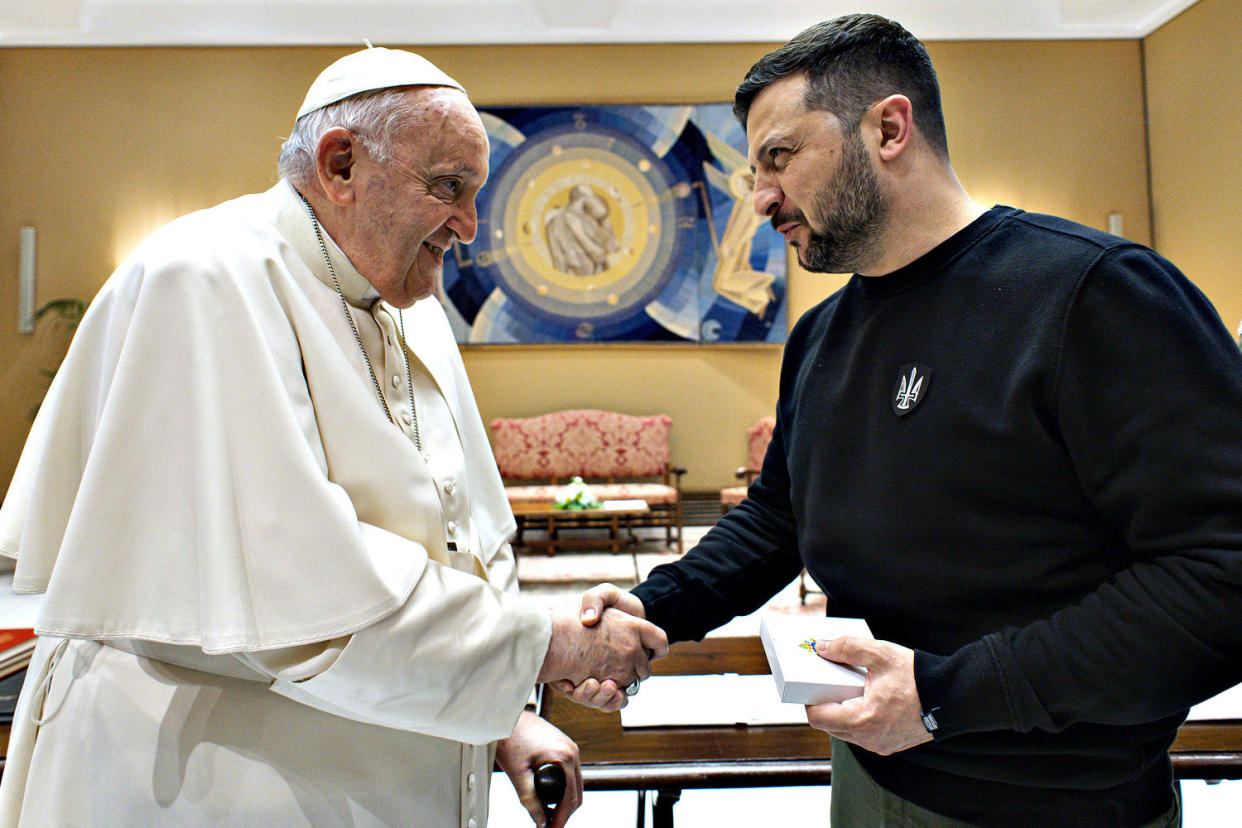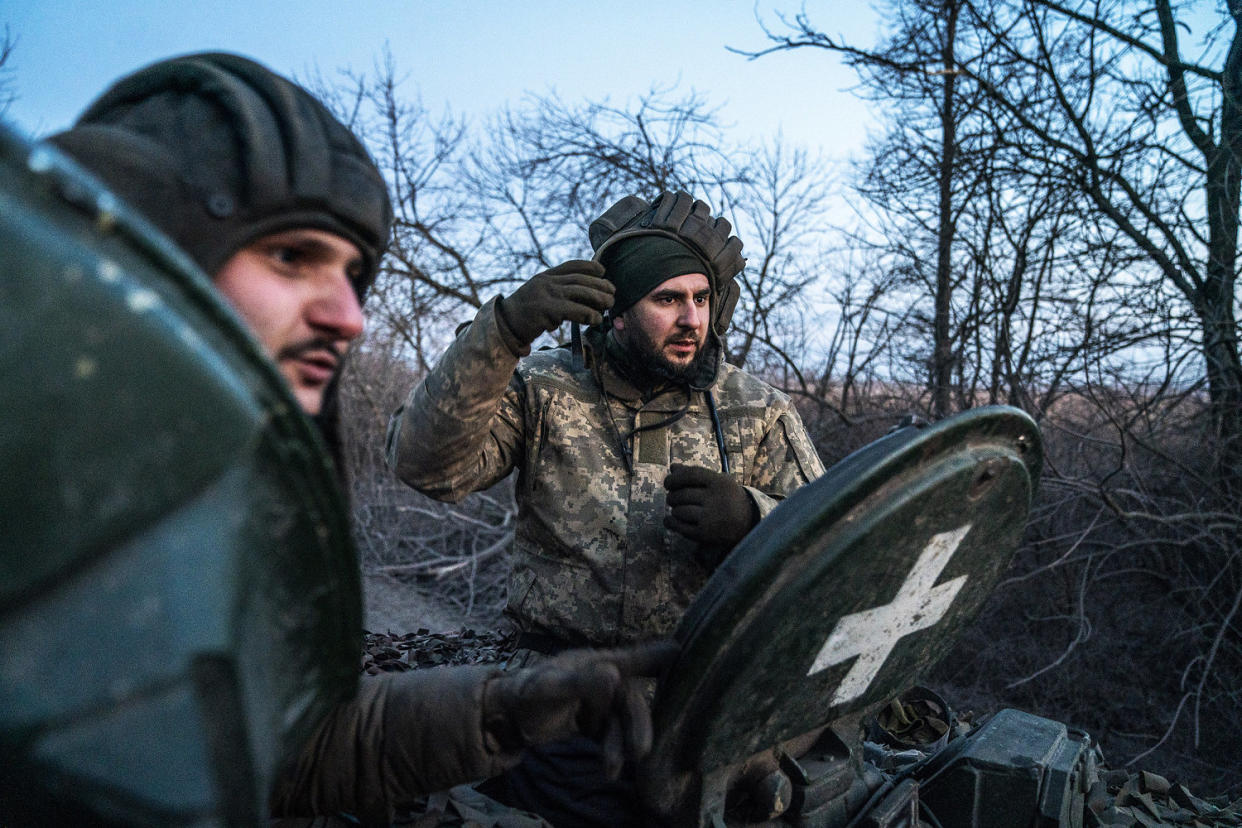Ukraine hits back at Pope Francis over 'white flag' remark urging peace talks with Russia
KYIV, Ukraine — Ukraine and its allies have expressed mounting fury at Pope Francis’ suggestion that it should have the “courage” to negotiate an end to the war with Russia.
Kyiv’s ambassador to the Vatican told NBC News on Monday that his country could not accept the pontiff’s logic — a hint of the intense backlash drawn by the comments, which are not the first by the pope to elicit anger from Kyiv, at a precarious moment for Ukraine on the battlefield and in the battle over public opinion.
“When you see that you are defeated and that things are not going well, you have to have the courage to negotiate,” Francis said in an interview with Swiss broadcaster RSI, which was recorded last month but partially aired on Saturday. He urged Ukraine to have what he called “the courage of the white flag.”
The response by outraged Ukrainians was immediate.
“Our flag is a yellow and blue one. This is the flag by which we live, die, and prevail. We shall never raise any other flags,” Ukrainian Foreign Minister Dmytro Kuleba wrote Sunday in a post on X.
Kuleba also called out the Vatican for its “strategy” in the first half of the 20th century, an apparent reference to accusations that the Catholic Church failed to act against the Nazis during World War II. “I urge to avoid repeating the mistakes of the past,” Kuleba added.
President Volodymyr Zelenskyy issued his own thinly veiled criticism in his nightly address Sunday, accusing Francis, without naming the pope directly, of “virtually mediating” the conflict from thousands of miles away.
“Russian murderers and torturers are unable to march farther into Europe only because they are being held back by Ukrainians holding arms under the blue-and-yellow flag,” Zelenskyy said. “There used to be many white walls of houses and churches in Ukraine, but they have now been scorched and ruined by Russian shells. This speaks volumes about who needs to stop for the war to end.”

Ukraine’s ambassador to the Vatican, Andrii Yurash, told NBC News that Kyiv could not accept that the victim of the aggression, rather than the aggressor, was being asked to raise the white flag. “Nobody at the time of World War II was proposing to the people enslaved by Hitler or those who were suffering or fighting him to start peace negotiations,” Yurash said in a phone interview from the Vatican. “Because a truce with Hitler was suicide and death. Similarly, a truce with Putin is suicide and death.”
And the Ukrainian Greek Catholic Church responded to Francis’ comments Sunday by saying that Ukrainians “cannot stop defending themselves, because capitulation means their death.”
Some of Ukraine’s closest allies were also critical. “How about, for balance, encouraging Putin to have the courage to withdraw his army from Ukraine?” Polish Foreign Minister Radosław Sikorski wrote on X. NATO Secretary General Jens Stoltenberg also appeared to address the pope’s remarks Monday, without directly referring to him. “President Putin started this war and he could end it today but Ukraine does not have this option,” Stoltenberg said. “Surrender is not peace.”
Francis sparked fury last year by praising Russia’s imperial rulers — the historical pretext that Putin often uses to help justify his invasion. The pope also said in the early months of the war that “NATO’s barking at Russia’s door” may have precipitated the Kremlin’s full-scale invasion of its neighbor.
Vatican spokesman Matteo Bruni sought to clarify the pope’s remarks, saying that the term “white flag” was part of the interviewer’s question and the pope was repeating it. The pontiff supported “a cessation of hostilities, a truce reached with the courage of negotiation,” Bruni said, not Ukraine’s outright surrender.
The critical reaction from Kyiv reflects its reluctance to publicly consider peace negotiations while President Vladimir Putin remains in power, despite growing signs that its Western allies are growing weary of supporting the war and might share in the pope’s views that, sooner or later, Kyiv will have to take a seat at the negotiating table.
That trend could intensify if former President Donald Trump returns to the White House, given his friendly relationship with Putin and his stated intention of ending the war within 24 hours if elected, without saying how.

Moscow has been publicly pushing for peace negotiations since the early months of the war, but only on conditions that are favorable to Russia. Ukraine has repeatedly said it wants to push the Russian army back to its borders as they stood at the time it gained independence in 1991, which implies the ambitious goal of reclaiming the Russian-annexed Crimean Peninsula.
Ukraine’s war effort has been seriously hampered in recent months by stalled U.S. aid, ammunition shortages and growing discord among its backers. The Kremlin has taken advantage, with its army making steady advances on the battlefield.
Asked about Francis’ comments on Monday, Kremlin spokesman Dmitry Peskov said that Putin had also repeatedly talked about “our readiness and openness to solve our problems by way of negotiations,” but that Kyiv had rejected any possibility of talks.
Daryna Mayer reported from Kyiv, and Yuliya Talmazan from London.
